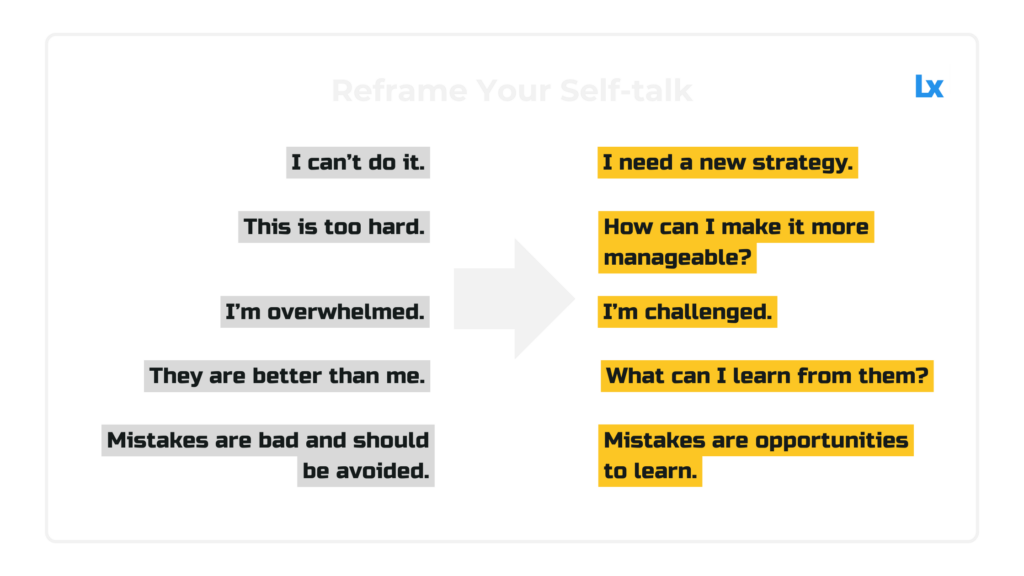
Cognitive Reframing: You Aren’t Happy… Yet!
by Iana Galai ● August 14, 2023
We all have limiting thoughts. Some of them seem inherent (“I can’t sing”), while others are our own or other people’s opinions that have somehow stuck with us and turned into convincing self-narratives over time. “I am not cut out for being a manager,” “I always overshare,” “I can’t manage my time…” These presets may harm and limit us, but they also, in a sense, make us unique and contribute to our identity. That is why it is sometimes so hard to get rid of them. Cognitive psychologists suggest practicing reframing as one effective way to deal with self-limiting beliefs.
Reframing as a Concept
Reframing strategy stems from the 1960s cognitive therapy by Aaron T. Beck, who treated patients suffering from depression. During his work, he noticed that changing self-talk patterns helped patients improve their conditions. These days, reframing proliferates among popular psychology authors and coaches. One reason for the success of this strategy is its effectiveness. Multiple studies continuously prove that cognitive reframing can improve our beliefs about ourselves and even our physical conditions.
Reframing Learning
One of the most well-known authors who suggest using reframing is Carol Dweck, a professor at Stanford University and the author of “Mindset: How You Can Fulfill Your Potential.” Together with her colleague Claudia Mueller, Dweck studied how beliefs affected performance in children. They discovered that kids who believed they were smart did worse and showed less determination than kids who thought they worked hard.
Dweck’s subsequent experiments proved that reframing from “I am smart and talented” into “If I work hard, I can achieve things” significantly improved people’s performance. In her book, Dweck explains that shifting our thoughts from what we can’t change (the lack of talent or IQ) to something within our control (how much effort we invest) can result in higher motivation and productivity, leading to greater results.

As part of another reframing strategy, Carol Dweck suggests adding “yet” to self-limiting thoughts. She calls it “The Power of Yet.” For example, instead of thinking, “I am not good at Math,” think, “I am not good at Math, yet.” It will help you turn a rigid, unchanging statement into a “work in progress.” This mindset shift will show you that everything is achievable if only you try hard enough.
Reframing Yourself
Despite the undeniable benefits of the mindset theory, research on ability and talent isn’t the most groundbreaking. What is fascinating is the idea that changing what we think can also affect our bodily responses. In a podcast with neuroscientist Andrew Huberman, researcher Alia Crum talks about the fascinating study she worked on at Yale. Her hypothesis was that our beliefs about what we eat affect our biological responses. She conducted the famous milkshake experiment to prove her theory.
In the experiment, a batch of milkshakes was labeled in two very different ways. Some labels said it was a high-calorie shake, while others said the opposite. After the participants consumed the shake, the amount of the hunger hormone called ghrelin was measured. It turns out that what people believed affected their hunger levels. If they thought the shake was fattening, they felt they had eaten more, and the level of the hunger hormone was lower. Crum then concluded that what we believe about food changes how our bodies respond to it. Simply thinking “I have had enough” instead of “I am still hungry” can affect how our body responds.
Reframing Stress
The reframing technique also seems to be able to change our stress response. In 2015, psychologist Kelly McGonigal challenged the world with her groundbreaking book, “The Upside of Stress.” Having studied some of the forefront health research on stress (including some by Alia Crum), Kelly concluded that the message of stress toxicity is counterproductive and even harmful. According to her, thinking that stress is bad does not make people avoid it but, in turn, makes them even more stressed.
To confirm this idea, Kelly McGonigal brings up the results of the Trier Social Stress Test that researcher Jeremy Jamieson conducted with his team at the University of Rochester. The scientists primed two groups of participants about how stress affects them. Some participants were told that stress was harmful to their health, while others were told that stress was a natural response preparing the body for challenges and can enhance their performance. Both groups were then subjected to stressful activities, such as public speaking and Math tests.
The results were fascinating. The group primed to view stress as enhancing performed better on the task and showed a different physiological response to stress. Their blood vessels stayed relaxed, indicating a healthier cardiovascular response. On the other hand, the group that viewed stress as harmful experienced constricted blood vessels, which is associated with negative health outcomes. There were also changes in how participants reported they were feeling. The first group experienced higher motivation and less anxiety than the other groups.
This study suggests that reframing stress as a natural and beneficial response can change how our bodies react to it and potentially improve our performance in challenging situations. As a practical exercise, scientists advise embracing physical reactions during stress and telling yourself “I am excited at this challenge” instead of trying to calm down and suppress these reactions.
Conclusion
Cognitive reframing is a powerful tool that can help us overcome self-limiting beliefs, improve performance, and even impact our physiological responses. By changing how we think about ourselves, our abilities, and stressful situations, we can unlock our potential and achieve greater success. So, the next time you catch yourself thinking, “I can’t do this” or “I’m not good at that,” try reframing it with a more empowering perspective. Remember, you might not be happy with your current situation, but with the right mindset and effort, you can work towards a better future. You aren’t happy… yet!
References:
Adams, S. (2023). Reframe Your Brain. Scott Adams, Inc.
- Crum AJ, Corbin WR, Brownell KD, Salovey P. Mind over milkshakes: mindsets, not just nutrients, determine ghrelin response. Health Psychol. 2011 Jul;30(4):424-9; discussion 430-1. doi: 10.1037/a0023467. PMID: 21574706.
- Dweck, C. (2017). Mindset: Changing the Way You Think to Fulfill Your Potential. London: Robinson.
- McGonigal, K. (2016). The Upside of Stress: Why Stress Is Good for You, and How to Get Good at It. New York, New York: Avery.
- Wikipedia Contributors (2019). Cognitive therapy. [online] Wikipedia. Available at: https://en.wikipedia.org/wiki/Cognitive_therapy.
- Yeager, D.S. and Dweck, C.S. (2012). Mindsets That Promote Resilience: When Students Believe That Personal Characteristics Can Be Developed. Educational Psychologist, 47(4), pp.302–314. doi:https://doi.org/10.1080/00461520.2012.722805.
